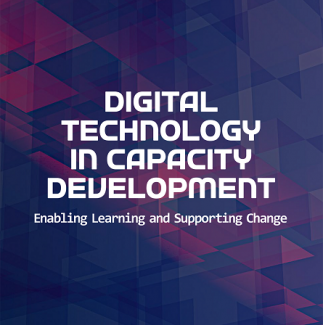
Digital Technology in Capacity Development: Enabling Learning and Supporting Change
Download publication files
Join us to debate some of the most issues around online learning in the 'Global South' in our upcoming webinar series.
- Beyond content delivery: How can we make online learning truly participatory? 31st March 2023, 12:00 GMT
- How to design online courses that mitigate infrastructure constraints? 25th April 2023, 12:00 GMT
- How can gender-responsive pedagogy inform the design of online courses? 16th May 2023, 12:00 GMT
Click here to watch the webinar recordings
--
While Covid-19 demonstrated some of the benefits of online learning, the widespread, often uncritical adoption of online tools driven by necessity has left many with an experience of ‘emergency online learning’. This book aims to assist in the design of technology-enhanced capacity development by sharing evidence of practices that are principled rather than rushed; inclusive rather than creating new digital divides.
- Part 1 sets out the main thinking that informs our overall approach and the frameworks that guide our practice.
- Part 2 explores a series of assumptions about technology-enhanced learning (TEL) that are common in the literature and against which we tested our data. It brings new evidence to bear on how TEL can be used more effectively as part of learning and capacity strengthening.
- Part 3 is designed as a practical guide to walk practitioners through the steps to create relevant, inclusive and sustainable digital learning interventions.
- Part 4 offers a collection of 16 case studies that illustrate how we have put the principles into practice.
We have worked to evidence how technology can be leveraged effectively to enhance or strengthen capacities of individuals, teams or systems. We make clear that there are no magic bullets, that online approaches are not simply quicker or cheaper substitutes, and that solutions need to be selected carefully, designed well, and significant time invested if it is to work well.
We hope Digital Technology in Capacity Development will be of interest to researchers and practitioners in a range of institutions, whether they are directly responsible for designing, delivering or evaluating new initiatives or whether they are advising or funding those who do.
